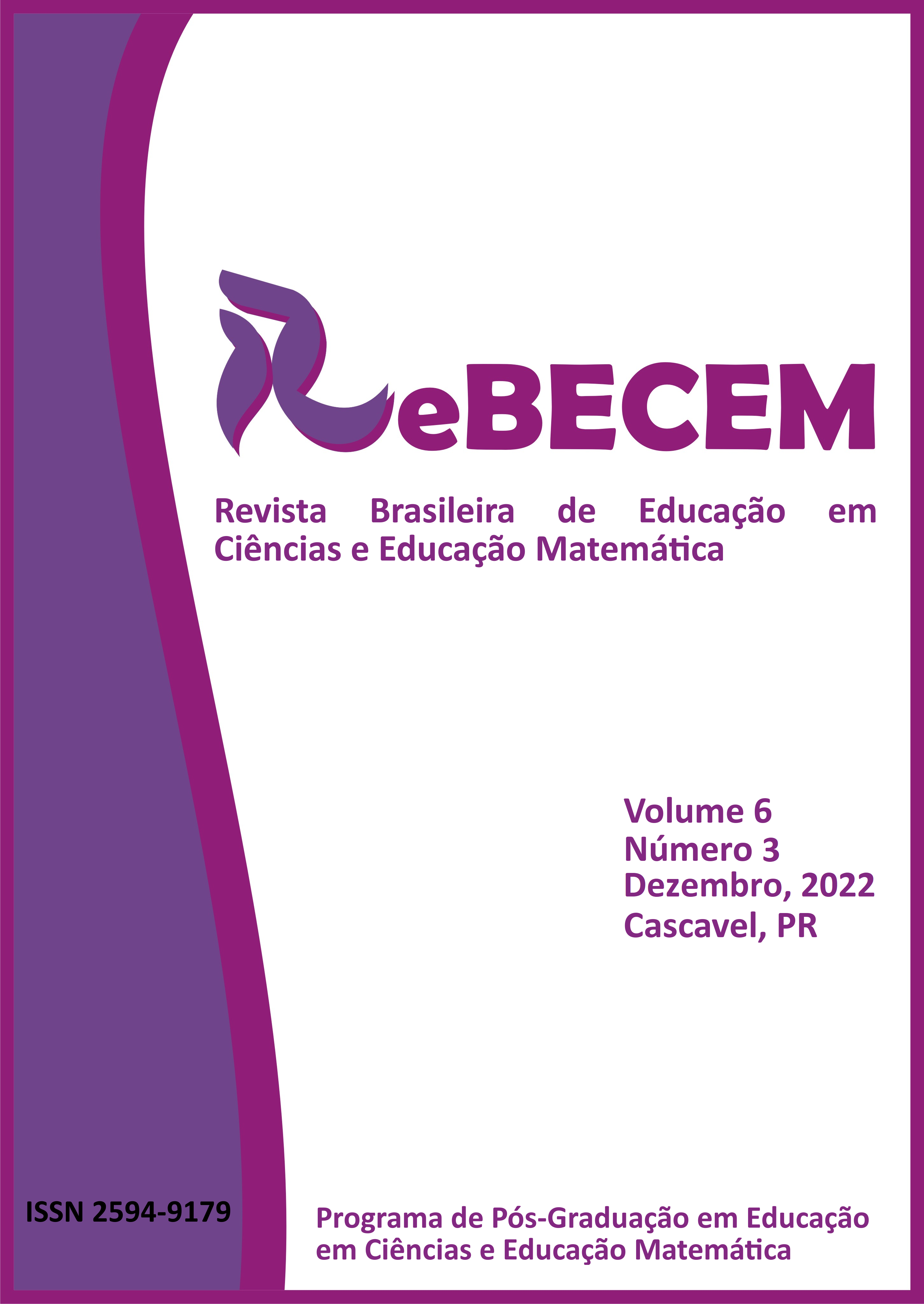The search for one or more winners strategies in a combinatorial board game
DOI:
https://doi.org/10.48075/ReBECEM.2.v.6.n.3.29673Keywords:
Game, Combinatorial Reasoning, Tree Diagram, Combinatorial GameAbstract
This work aims to make known the teaching-learning proposal about objects of basic knowledge of Combinatorics through a combinatorial game of strategy, on a board named Grid Quadrada 3 x 3, in line with the indications present in the Common National Curricular Base (BNCC) for students from the 5th Elementary School Year. The proposal aims to encourage the appropriation, exercise and development of combinatorial reasoning in decision-making regarding the movement of pet bottle caps on the board according to established rules, in order to construct a tree diagram that shows all the possibilities for the development of a match, from the initial movement, in order to evaluate the existence or not of one or more winning strategies, for each player. This is a bibliographical research that culminated in the proposal of the game, according to which the objective is to measure the importance and what contribution such a game represents for the improvement of teaching and learning of Combinatorics and to provide didactic material for use by teachers.
Downloads
References
BATANERO, C., GODINO, J. D., NAVARRO-PELAYO, V. Combinatorial reasoning and its assessment. In: GAL, I.; GARFIELD, D.J.B. (Ed.). The assessment challenge in statistics educativo. Minnesota: IOS Press, 1997. p. 239-252. Disponível em: <https://www.stat.auckland.ac.nz/~isi/publications/access bkref.>. Acesso em: 18 set. 2022
BERLEKAMP, E.; CONWAY, J.; GUY, R.Winning ways for your mathematical plays. Natick, Wwllwaley: A. K. Peters Ltd.2001.
BOUTON, C. Nim, a Game with a Complete Mathematical Theory, Annals of Mathematics, Princeton, 1901, p. 35-39.
BRASIL. Parâmetros Curriculares Nacionais. Matemática. 1º e 2º ciclos. Brasília: Ministério da Educação. Secretaria de Ensino Fundamental. 1997.
BRASIL. Base Nacional Comum Curricular. Brasília: Ministério da Educação. 2018. Disponível em: < http://basenacionalcomum.mec.gov.br/wp-content/uploads/2018/04/BNCC_19mar2018_versaofinal.pdf>. Acesso em: 18 set. 2022.
COBB, P., CONFREY, J., DISESSA, A., LEHRER, R. , SCHAUBLE, L. Design Experiments in Educational Research. American Educational Research Association, v. 32, n. 1, p. 9-13, 2003.
COLIPAN, X. Étude didactique des situations recherche pour la classe concernant des jeux combinatoires de type Nim, 384 f. Tese (Doutorado em Didática da Matemática) - InstitutoJoseph Fourier, Universidade de Grenoble 1, Grenoble, 2014.
COLIPAN, X. Desarrollo de la Actividad Científica em Clases a través del estúdio de Juegos Combinatorios, el Ejemplo del Juego del Chocolate. Revista Bolema, Rio Claro (SP), v. 30, n.
, p. 691-712. 2016.
DUCHENE, E. Jeux combinatories sur les grafes. Tese (Doutorado em Matemática) - Institut Joseph Fourier, Grenoble, 2006.
FISCHBEIN, Efrain. The intuitive sources of probabilistic thinking in children. Dordrecht: Reidel. 1975.
FRANCO, M. A. S. Pedagogia da Pesquisa-ação. Revista Educação e Pesquisa, São Paulo, v. 31, n. 3, p. 483-502. 2005. Disponível em:
. Acesso em: 18 set 2022
GRANDO, Regina Célia. O conhecimento matemático e o uso de jogos na sala de aula. 2000. 224 f. Tese (Doutorado em Educação) - Faculdade de Educação, Universidade Estadual de Campinas, Campinas (SP), 2000. Disponível em: <http://www.repositorio.unicamp.br/handle/REPOSIP/251334>. Acesso em: 18 set. 2022
INHELDER, B., PIAGET, J. Da lógica da criança à lógica do adolescente: ensaio sobre a construção das estruturas operatórias formais. Traduçãoo de Dante Moreira Leite. (Biblioteca Pioneira de Ciencias Sociais. Psicologia). São Paulo: Pioneira, 1976. 259 p.
NAVARRO-PELAYO, V., BATANERO, C., GODINO, J. D. Razonamiento combinatório em alumnos de secundaria. Educación Matemática, v. 8, n. 1, p. 26-39. 1996.
MUNIZ, C.A. Brincar e jogar: enlaces teóricos e metodológicos no campo da educação matemática. Belo Horizonte: Autêntica Editora. 2010. Disponível em:
< http://www.periodicos.rc.biblioteca.unesp.br/index.php/bolema/article/view/4604>. Acesso em: 18 set. 2022.
TEIXEIRA, P. J. M. Práticas de professores do ensino fundamental durante a resolução de problemas de contagem. Educação Matemática Pesquisa, São Paulo, v. 22, n. 2, p. 081-113. 2020.
TEIXEIRA, P. J. M. Curiosidades, Passatempos, Desafios e Jogos Combinatórios. São Paulo: Editora Livraria da Física. 2021.
SHULMAN, L. S. Those who understand: knowledge growth in teaching. Educational, v. 15, n. 2, p. 4-14. 1986.
Downloads
Published
How to Cite
Issue
Section
License
Copyright (c) 2022 Paulo Jorge Magalhaes Teixeira

This work is licensed under a Creative Commons Attribution-NonCommercial-ShareAlike 4.0 International License.
Autores que publicam nesta revista concordam com os seguintes termos:
1. Autores mantém os direitos autorais e concedem à revista o direito de primeira publicação, com o trabalho simultaneamente licenciado sob a Licença Creative Commons Attribution que permite o compartilhamento do trabalho com reconhecimento da autoria e publicação inicial nesta revista.2. Autores têm autorização para assumir contratos adicionais separadamente, para distribuição não-exclusiva da versão do trabalho publicada nesta revista (ex.: publicar em repositório institucional ou como capítulo de livro), com reconhecimento de autoria e publicação inicial nesta revista.
3. Autores têm permissão e são estimulados a publicar e distribuir seu trabalho online (ex.: em repositórios institucionais ou na sua página pessoal) a qualquer ponto antes ou durante o processo editorial, já que isso pode gerar alterações produtivas, bem como aumentar o impacto e a citação do trabalho publicado (Veja O Efeito do Acesso Livre).
Licença Creative Commons
Esta obra está licenciada com uma Licença Creative Commons Atribuição-NãoComercial-CompartilhaIgual 4.0 Internacional, o que permite compartilhar, copiar, distribuir, exibir, reproduzir, a totalidade ou partes desde que não tenha objetivo comercial e sejam citados os autores e a fonte.













